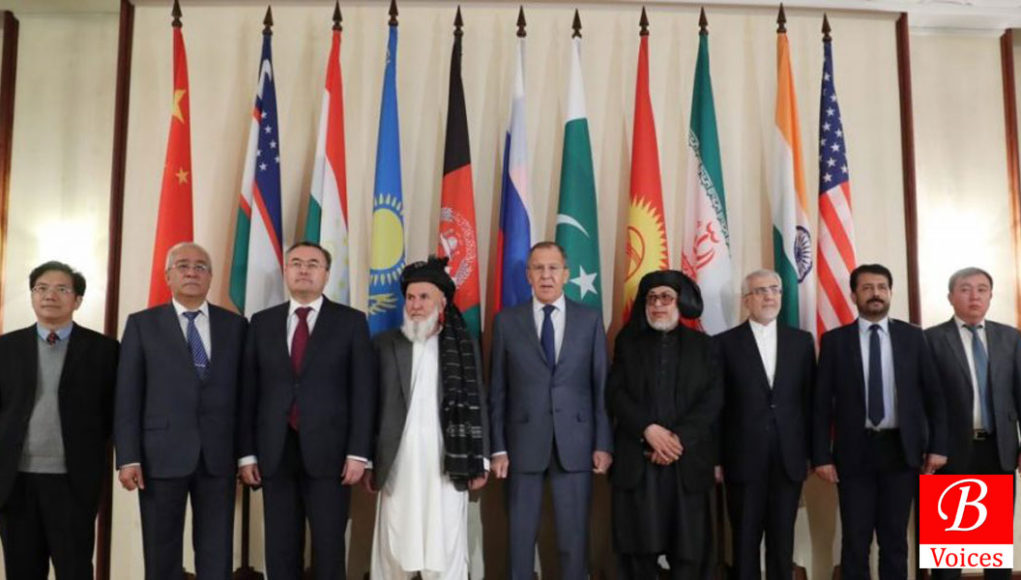 Noor Rehman
Noor Rehman
Taliban US talks give a ray of hope to the peace thirsty Afghans to end the eighteen years long bloodshed in Afghanistan. A peaceful settlement could also pacify the locals of neighboring countries bordering Afghanistan affected by the spillover effect of the year’s long war on terror. US representatives and Afghan Taliban held many rounds of talks in Qatari capital Doha and two rounds of talks were held in Moscow between Afghanistan senior politicians headed by former president Hamid Karzai and Taliban, without the official presence of Kremlin and Afghan government. Amid this situation, without taking into confidence the domestic Afghans, the peace talks in abroad and foreign capitals will only bring death and destruction in the war ravaged Afghanistan. The Afghan government, civil society, political parties, tribal chiefs, ethnic and religious minorities’ presence and say can make the peace negotiations participatory, inclusive and Afghan owned.
Taliban repeatedly maintained the stance of declaring Afghan government as puppet and American installed and declined to talk Afghan’s government official representatives. Taliban firmly adhere to the stance that they are the legal and legitimate heirs to the capital throne but retrospectively their claim can be criticized on many grounds, which could make them proxies and puppets rather than a legitimate political force of Afghanistan. Taliban foothold started in late 1990s from Mazir-e-sharif and controlled majority of the Pashtuns dominated areas through ruthless and ferocious means of violence with maximum external support. During Taliban rule from 1996-2001, they were fighting consistently against the rival groups mainly Northern Alliance. Pakistan, UAE and Saudi Arabia only gave a diplomatic recognition to the Taliban government, the rest of the world mainly Russia, United Nations, European Union, Turkey, Iran and Uzbekistan supported and recognized Northern Alliance (United Front of Afghanistan) as Afghanistan legitimate government. Burhanudin Rabbani and Ahmad Shah Massoud were recognized as president and foreign minister respectively and even Ahmad Shah Massoud visited European Union and addressed the European Union parliament prior to 9/11. The operation “Enduring Freedom” toppled Taliban regime, and in December 2001 under Bonn agreement Afghanistan Interim Authority was established, in which a lion share of power was given to the Northern Alliance cadres.
When Gulbuddin Hekmatyar “butcher of Kabul” a veteran warlord and chief of militant Hizb e Islami, can strike a deal with Afghan government to become a part of the system and turned his militant Hizb e Islami into a political fold. Why not Taliban can come under such an inclusive and Afghans owned peace formula. Beside Gulbuddin Hekmatyar many other reluctant figures and staunch Islamists joined the Kabul government, in which Burhanuddin Rabbani, Abdul Rasul Sayyaf, Sibghatullah Mojadedi were the prominent figures.
On the external front United States, Pakistan, India, Iran, China and Russia are the main stake holders in the Afghan peace process. America want an early exit to achieve maximum political gains at home as Donald Trump already took unprecedented moves i.e. withdrawal from Iran nuclear deal, pullout from Paris climate change agreement, US embassy move from Tel Aviv to Jerusalem etc. to full fill his election promises. America hasty pullback without orchestrating a power sharing formula and political settlement among the opposing parties could prove highly detrimental to the peace in the region.
The emergence of ISIS in the Afghanistan alert the regional states especially Russia and Iran to find a way forward. In 2016 Russia special envoy to Afghanistan Zamir Kabulov stated that “Taliban interests objectively conceded with us”. Both Russia and Taliban perceive ISKP an imminent threat in the region. Iran in the same vein as Russia had bitter historical rivalry with Taliban but the presence of US in the Iranian backyard compelled Iran to covertly support Taliban but the advent of ISIS and its attack on Iran soil shift the historical tide of Iran-Taliban rivalry into cooperation and over whelming support against anti-Shia ISIS.
Pakistan a historical protégé of Taliban and a firm critique of secular nationalist governments in Afghanistan, in which the current government is not an exception, want Taliban back to assume the reign of Afghanistan. Pakistan is one of the main stake holders in the current peace talks, exert her influence through Taliban to gain strategic depth and counter Indian influence in the region. China an inspiring regional power have security and economic stakes in Afghanistan. China want peace in Afghanistan as Chinese analysts claimed that post US troop’s withdrawal, volatile Afghanistan could jeopardize CPEC and BRI projects in the region. East Turkistan a separatist movement has operated from Afghanistan and Pakistan in the past, could re-initiate his activities in case of instability in Afghanistan.
Here it is concluded that Afghan peace is conditional to the inclusiveness of all Afghan factions and termination of meddling from the neighboring states. Engagements with Taliban and bypassing the Afghan government can make the matters worse for the future of Afghanistan. Talks in the outland and ignoring relevant stakeholder in the peace process can repeat the history of bloody civil erupted after USSR forces withdrawal.
Disclaimer: Views expressed in this article are those of the author and Balochistan Voices not necessarily agrees with them.
Share your comments!








